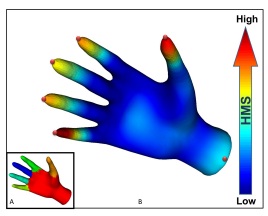Abstract: 3D mesh segmentation is a fundamental low-level task with applications in areas as diverse as computer vision, computer-aided design, bio-informatics, and 3D medical imaging. A perceptually consistent mesh segmentation (PCMS), as defined in this paper is one that satisfies 1) in-variance to isometric transformation of the underlying surface, 2) robust to the perturbations of the surface, 3) robustness to numerical noise on the surface, and 4) close conformation to human perception. We exploit the intelligence of the heat as a global structure-aware message on a meshed surface and develop a robust PCMS scheme, called Heat-Mapping based on the heat kernel. There are three main steps in Heat-Mapping. First, the number of the segments is estimated based on the analysis of the behavior of the Laplacian spectrum. Second, the heat center, which is defined as the most representative vertex on each segment, is discovered by a proposed heat center hunting algorithm. Third, a heat center driven segmentation scheme reveals the PCMS with a high consistency towards human perception. Extensive experimental results on various types of models verify the performance of Heat-Mapping with respect to the consistent segmentation of articulated bodies, the topological changes, and various levels of numerical noise.
Download file here.


